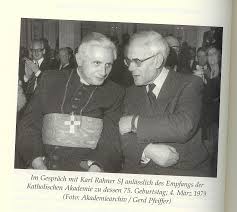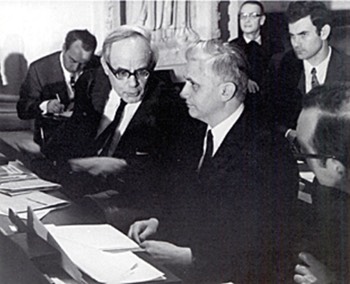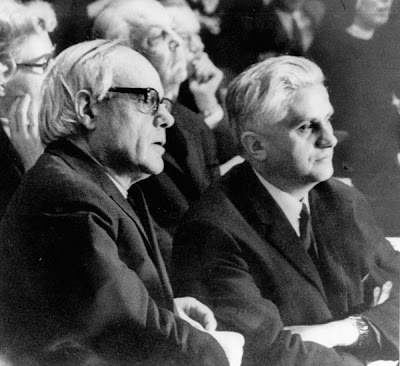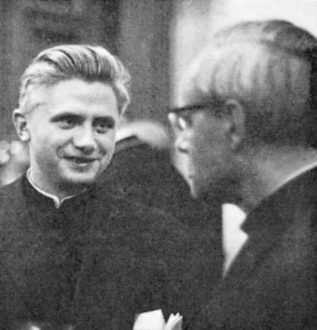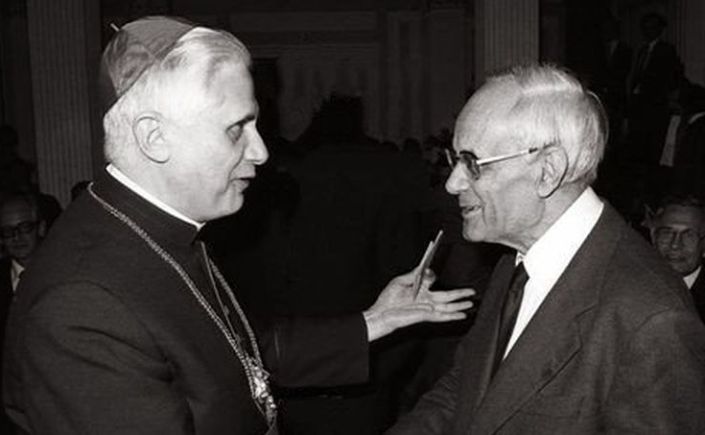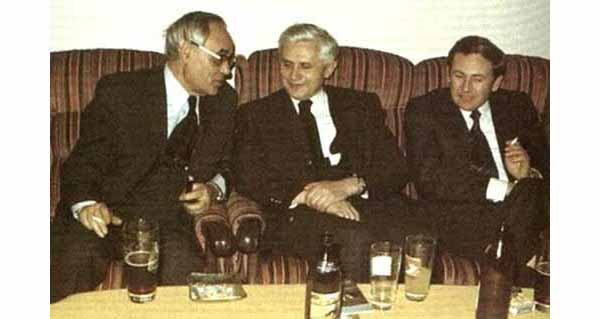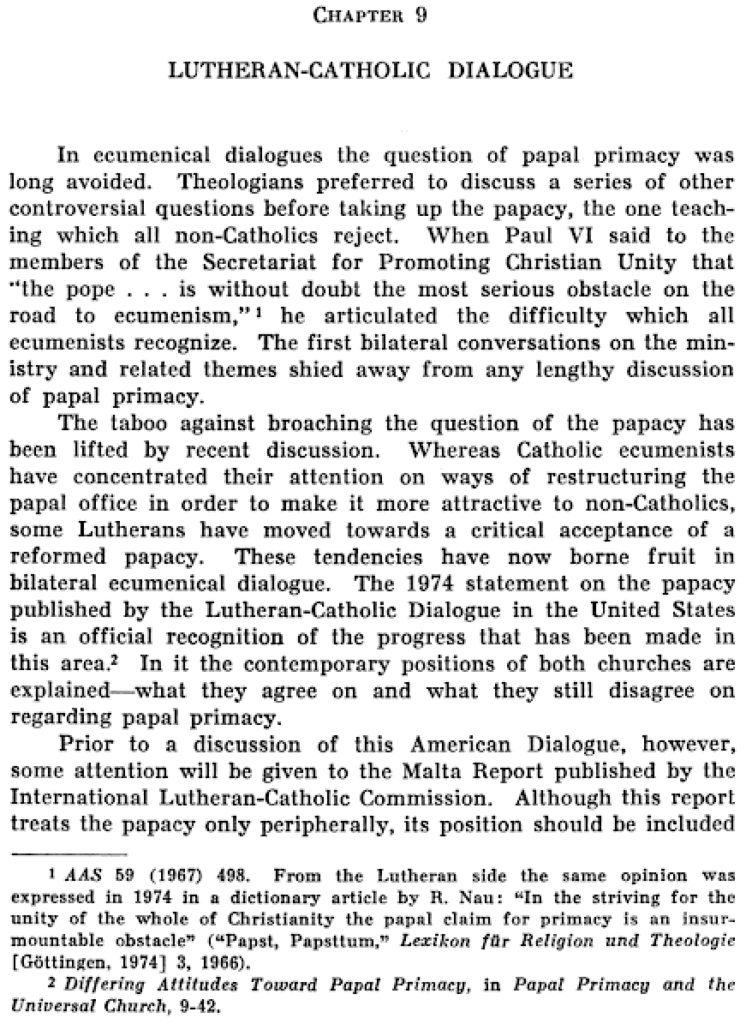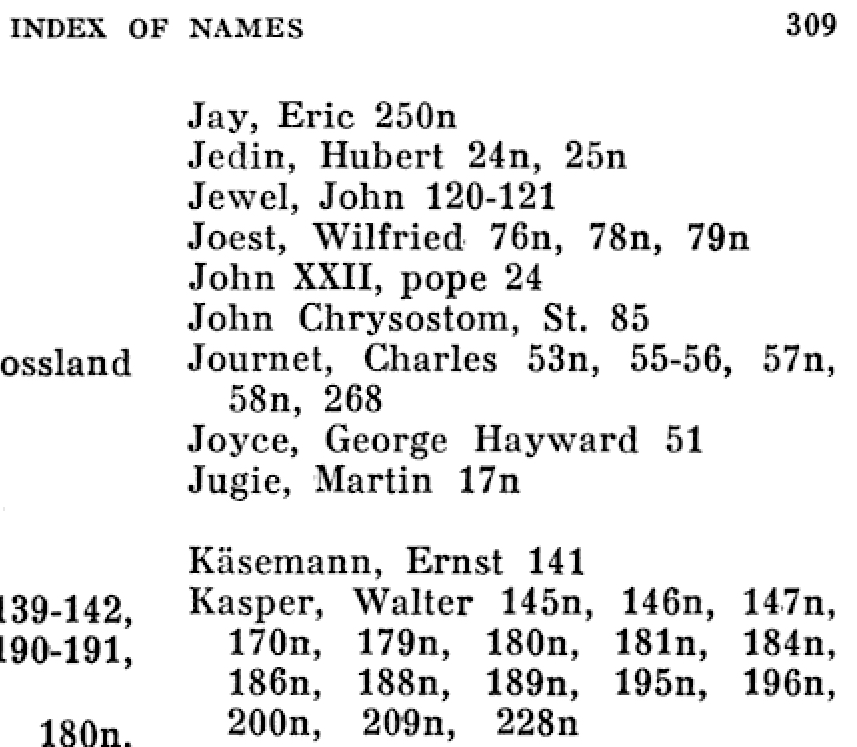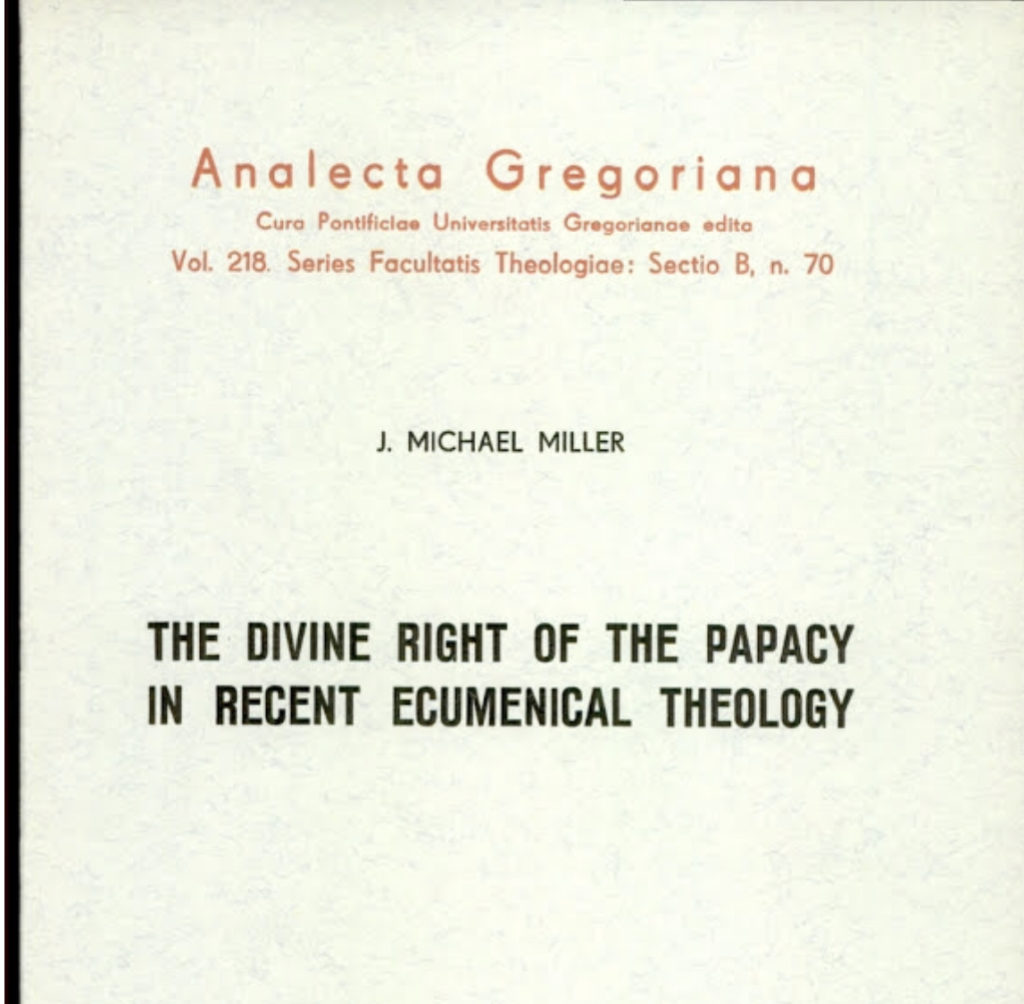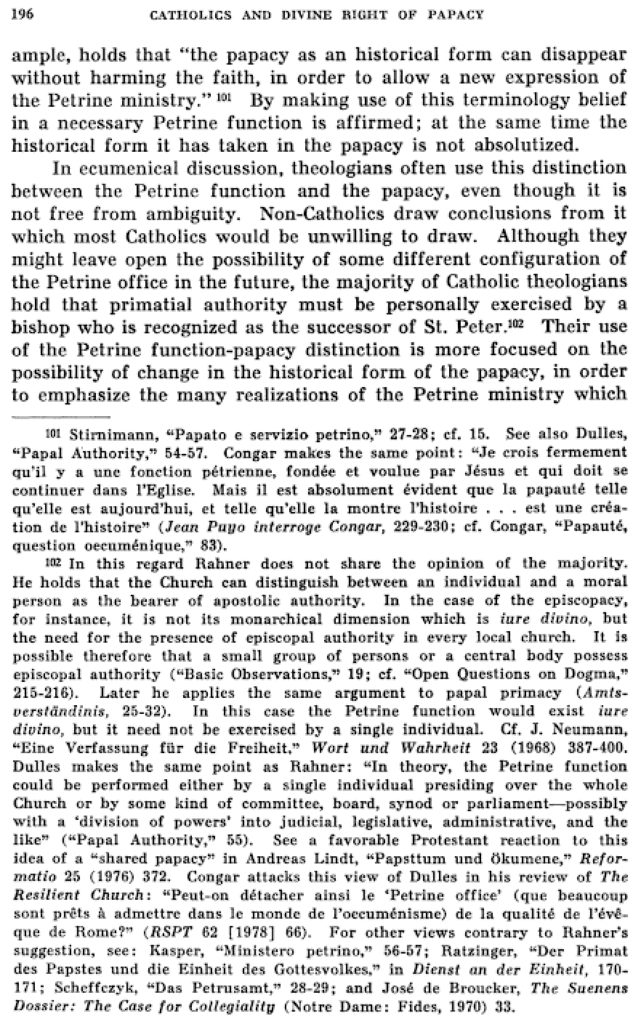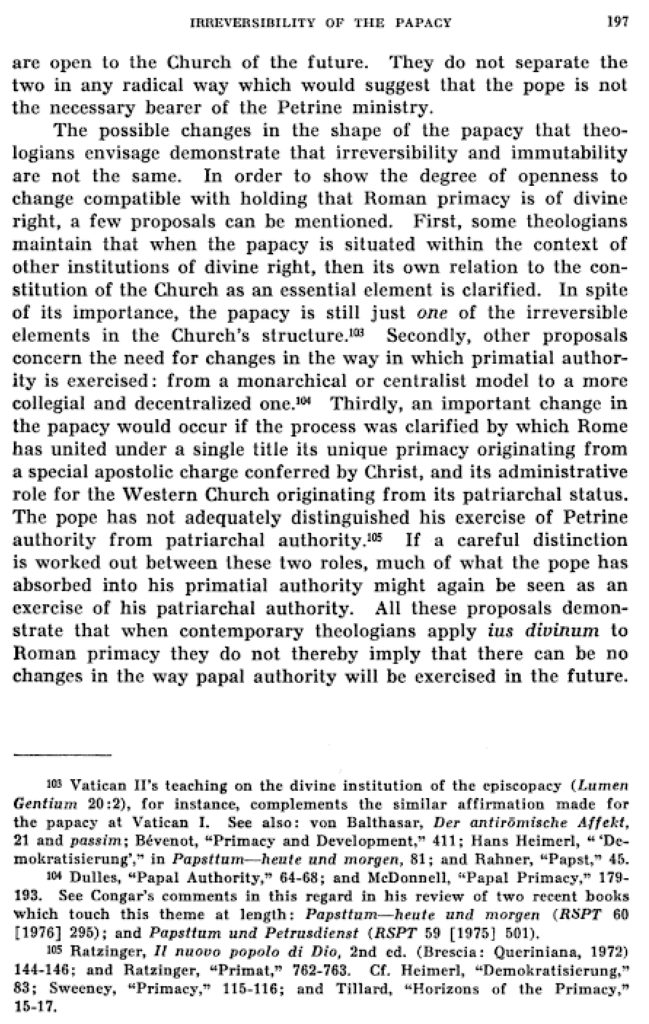UPDATE: Full German citation with English translation requested below received and posted immediately above!
Pope Benedict’s partial attempted renunciation speech of 11 February, ARSH 2013:
I am well aware that this office [munus], according to its spiritual essence, ought to be exercised not only by acting and speaking, but no less than by suffering and praying. Moreover, in the world of our time, subjected to rapid changes and perturbed by questions of great weight for the life of faith, there is more necessary to steer the Barque of Saint Peter and to announce the Gospel a certain vigor, which in recent months has lessened in me in such a manner, that I should acknowledge my incapacity to administer well the ministry [ministerium] committed to me. On which account, well aware of the weightiness of this act, I declare in full liberty, that I renounce the ministry [ministerio] of the Bishop of Rome, Successor of Saint Peter, committed to me through the hands of the Cardinals on April 19, 2005, so that on February 28, 2013, at 20:00 Roman Time [Sedes Romae], the see of Saint Peter be vacant, and that a Conclave to elect a new Supreme Pontiff be convoked by those whose duty it is [ab quibus competit].
An OFFICE and its MINISTRY or ADMINISTRATION are two different things. Let’s take a couple of examples to understand why these words are NOT synonyms, and have never been considered such.
For the first example, let’s look at the American OFFICE of the Presidency. When President Reagan was shot and taken into surgery wherein he lost over half his blood volume, he did not lose the OFFICE of the Presidency. Even in an induced coma he was still 100% the sole occupant of the OFFICE of the Presidency. What did happen is that the ADMINISTRATIVE authority passed to Vice President Bush (Alexander Haig’s claims to administrative authority notwithstanding) who immediately returned to Washington D.C., and ADMINISTRATIVE authority remained with Bush until Reagan regained consciousness. In this period, Vice President Bush did NOT become the President, he was merely the person with Administrative authority, and was still “Mr. Vice President”. Because, of course, there can never be two Presidents of the United States (Hillary Clinton’s claim to being co-President during Bill Clinton’s administration notwithstanding.)
Note that adMINISTRATION and MINISTRY have the same root, the Latin MINISTERIUM.
President Reagan, while temporarily unable to exercise the ADMINISTRATION of the OFFICE of the Presidency, did NOT lose his OFFICE, nor was his OFFICE conferred upon anyone else. ADMINISTRATIVE authority temporarily passed to Vice President Bush, who remained Vice President even while holding temporary ADMINISTRATIVE authority. Vice President Bush became neither President nor co-President in ARSH 1981.
The second example is the assasination attempt of Pope John Paul II a few weeks later in ARSH 1981.
Like Reagan a few weeks earlier, Pope JPII was rushed into surgery wherein he lost most of his blood volume after being shot, and went into cardiac arrest on the operating table wherein he had to be resuscitated. While Pope JPII was incapacitated by anesthesia/induced coma, he was incapable of carrying out the Papal MINISTRY because… he was in a coma. But he did not lose the OFFICE of the Papacy. The OFFICE remained with him and him alone, and would have remained with him no matter how long he was comatose.
If you think about it, you will realize that many DOZENS of Popes have been rendered unable to perform the Petrine MINISTRY for various lengths of time – usually at the end of their lives – but retained the OFFICE until they died. As we all know, some people get old and their death is near-instant, that is they “drop dead”. Pope John Paul I died this way. He dropped dead. But, many times, the end stage of life is not sudden. Many people “go downhill” and are bedridden and unconscious for a period of time before they expire. Cancer, organ failure, neurodegenerative diseases, even surviving an incapacitating stroke. Do we honestly believe that this has NOT happened to previous Popes? Of course it has happened. Many, many times. The Vatican simply did not publicly announce these things up until just a few decades ago. Popes were rarely seen, and even more rarely heard. The era of the “highly visible Pope” began, more or less, with Pope Pius XII, and was taken into overdrive by Pope JPII himself. When a Pope would near death or merely fall gravely ill, the day-to-day running of the Vatican continued apace even though the Pope was no longer able to administer the Petrine MINISTRY. The OFFICE remained his until he died. If he recovered such that he was able to resume the Petrine MINISTRY, he would do so as the sole holder of the Petrine OFFICE.
Let it also be noted that a Pope could also lose his ability to exercise the Petrine MINISTRY by virtue of being imprisoned – but an imprisoned Pope would still retain 100% the OFFICE of the Papacy. An imprisoned Pope would remain Pope until he died. If he were to be liberated from imprisonment, he would then resume the Petrine MINISTRY as the holder of the Petrine OFFICE.
So, we can clearly see and easily understand that these two terms are DIFFERENT THINGS, and are NOT SYNONYMOUS.
The notion that Pope Benedict XVI Ratzinger is “too stupid” to be aware of this difference is laughable. If an American convert gal with a degree in Animal Husbandry (but definitely NOT Latin) can see and understand this, then it goes without saying that Joseph Ratzinger does too. To argue otherwise would be to argue that Ann Barnhardt is more intelligent than Jospeh Ratzinger. And do we REALLY want to do that? I mean, if you really, really want to, go ahead, but I would strongly advise against it.
But wait, there’s more….
We KNOW that Pope Benedict XVI Ratzinger had heard of the false hypothesis of bifurcation of the Papacy into a collegial, synodal office precisely by having a sitting Pope renounce the MINISTRY but not the OFFICE, thus resulting in an “active” and a “contemplative” Pope simultaneously.
How do we know this? Because Pope Benedict’s good friend and mentor, to whom he looked up tremendously, KARL RAHNER, proffered EXACTLY this false notion in ARSH 1974 in his work “Vorfragen zu einem okumenischen Amtsverstandnis”. In the opening pages of this work, Rahner advocated the dissolution of the Petrine OFFICE such that multiple people could simultaneously exercise the Petrine MINISTRY.
Karl Rahner was greatly admired by Ratzinger, and they were close friends. Rahner died a liberal, but Ratzinger drifted back toward orthodoxy as he grew older and saw the damage done by the very heterodoxy that he, Rahner and all of the other “Nouvelle Theolgie” (New Theology) proponents of the 20th Century inflicted upon the Church, with its zenith at Vatican II.
Pullquote from the Wiki page on the Nouvelle Theologie, with hyperlinks intact:
“The theologians usually associated with Nouvelle Théologie are Henri de Lubac, Pierre Teilhard de Chardin, Hans Urs von Balthasar, Yves Congar, Karl Rahner, Hans Küng, Edward Schillebeeckx, Marie-Dominique Chenu, Louis Bouyer, Jean Daniélou, Jean Mouroux, Henri Bouillard, and Joseph Ratzinger (later Pope Benedict XVI)”
Here is what I need, and perhaps my German readers can help with this. I need the exact passage from Rahner’s “Vorfragen zu einem okumenischen Amtsverstandnis” and its English translation. While I can see the book available online, even if I bought it, I couldn’t read it and find the passage because I speak ZERO German. The German language is just squiggles on a page to me. I can see numerous references to it by others, but I can’t find the text itself.
{UPDATE: Full German citation with English translation requested above received and posted here!}
But remember folks, there is NO EVIDENCE of Substantial Error or that Pope Benedict XVI intended to “fundamentally transform the Papacy into a collegial, synodal office” along the lines of OFFICE vs MINISTRY, and to even discuss such a thing is “grasping at straws” due to an inability to accept that Vatican I “might have been wrong”, and that Our Lord’s promise to Peter was a “pretty useless guarantee”. And also, SHUT UP. YOU’RE INSANE. </sarcasm>
As always, I hope this helps.
Here are some pictures of Rahner and Ratzinger together over the years, including at Vatican II:
